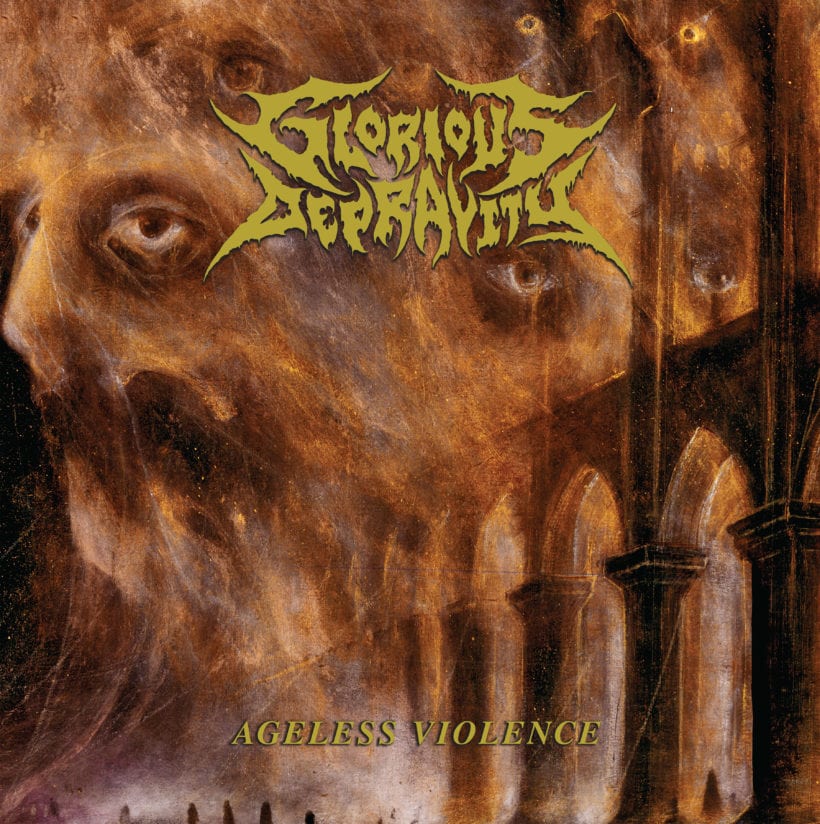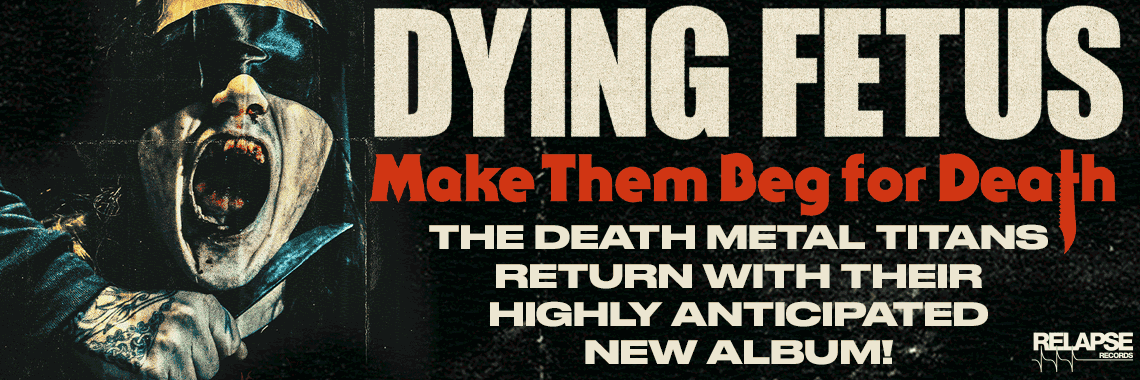
Ageless Violence, the first album from New York City underground metal “supergroup” Glorious Depravity, is a must-hear slab of pure fucking death metal. Inspired by the death metal bands of the ’90s, Ageless Violence fires off riff after riff in primitive, effective fashion.
Unlike many current old-school death metal bands, the members of Glorious Depravity source their ideas from some of the ’90s most-successful albums, citing records like Heartwork and Domination. The end result is a well-produced, no-frills album that wastes no time—at only seven tracks, Ageless Violence is lean but it doesn’t feel like Glorious Depravity left anything on the table.
Guitarists Matt Mewton (Woe, Belus) and George Paul (Mutilation Rites) are at the forefront, supported by drummer Chris Grigg (Woe) and bassist John McKinney. The four craft high-speed death metal that vocalist Doug Moore (Pyrrhon) adds the finishing touches to with his diverse vocal range.
Glorious Depravity don’t rewrite the book on death metal and they don’t try to; instead, they use the book to bludgeon the listener, delivering a collection of death metal songs that stand out even in another loaded year for the genre. Ageless Violence comes out on November 27 via Translation Loss, but it’s available for streaming below, alongside an interview with the band.
The members of Glorious Depravity come from various other active bands in NYC. How did this project come to be?
Mewton: Chris and I had been jamming on a side project back in 2016, right around the time I joined Woe and Hope Attrition came out. After that album and touring cycle, we knew we wanted to continue the project but it was imperative to us to add a second guitar and bass to the lineup. We’re both software engineers by day, and thought it would be amusing if we could assemble an all-nerd death metal outfit. We both thought of George immediately, who had been teaching himself to code, and he knew John, and within a couple of weeks the four of us were practicing regularly. It wasn’t until Doug joined the band in the spring of 2018 that we named the band Glorious Depravity. Doug’s vision for lyrical content really kickstarted the creative process and we began writing material for Ageless Violence in earnest. Since joining the band, Doug has also learned to code and is working with Chris’ company as a full-time engineer. The end result is the band full of nerds we were dreaming of, and an album we’re pretty stoked on to boot.
McKinney: I actually met George when he applied for a front end developer job at my company. We later reconnected at some tech conference where we actually talked about music. He asked me if I wanted to join a band of metalhead software engineers, which I of course jumped at (also I loved all of these guys’ other projects, so how could I say no?). Our first time getting in a room, we spent a solid hour talking about frameworks and code before actually turning on our amps. We’re very cool.
Did the COVID-19 pandemic affect the writing and recording process at all? How long has this album been in the works?
Mewton: The pandemic didn’t affect our writing process as we recorded Ageless Violence in the early fall of 2019, and mastering was done in early 2020. However, release plans were put on hold due to the virus, and it took a few months to solidify most of that stuff which is to be expected. Thankfully Translation Loss was very excited to work with us and we made it happen. Given how crazy this year has been for everyone, getting to release this record on a label that we all dig made it worth the wait.
Ageless Violence is, in many ways, your tribute to brutal bands of the past—what artists influence Glorious Depravity?
Moore: Most of our ideas come from the wave of thrashy death metal bands that got popular in North America during the early-mid ‘90s: Morbid Angel, Suffocation, Deicide, Cannibal Corpse and Ripping Corpse are probably our biggest direct influences. Outside that nexus of bands, there’s an element of Polish death metal involved via Vader and the first couple of Decapitated records. Vocally, I draw a bit on the style of more ‘splattery’ bands like Carcass and Exhumed for my arrangements.
We’re particularly interested in the era during which these bands started to write tighter songs and enjoyed bigger production budgets as the DM movement picked up commercial steam – Domination, The Bleeding, Heartwork, Black To The Blind, and so on. “Serious” death metal people often deride these albums as entry-level material or somehow unworthy of study, but they’re how we all got into extreme metal and were a big part of how we each developed our musical instincts. And they certainly hold up better than most of the third-tier demo shit that certain people like to pretend are the holy grails of early death metal! So that’s the sound we’re aiming to replicate: catchy, massive-sounding, and intense as fuck.
Is it challenging to write a project that tips its hat toward the past while still generating original ideas?
Moore: Even when I’m consciously trying to imitate other musicians—which I occasionally do in this project—I generally whiff and end up sounding like myself. So that’s not too much of a concern for me.
Mewton: We definitely draw on a ton of those 90s influences as Doug mentioned. I think for me, what makes the band fun to write for is harkening back to all those albums that made me go “ohhhh, fuck” when I was first discovering death metal. If we can write a song that evokes that feeling, we’ve done our job. So yeah, we have an acute awareness of our influences when writing; like sometimes we’ll refer to a riff as “the Deicide riff” or “the CC breakdown,” or something like that. That being said, when we’ve finally hammered out all the details to a song, most of the time we do feel like we’ve come up with an interesting take on a style we all revere. I guess to answer your question, it’s not challenging when you’re having a ton of fucking fun doing something.
McKinney: To me, there’s a lot of trying to recapture the feeling you got the first time you heard something like Once Upon the Cross without trying to necessarily imitate that sound. I remember being a teenager learning guitar and listening to Slayer or Napalm Death, saying, “Holy shit, how can anyone play that fast?” and then trying to restrain myself from kicking over my dresser when the bouncy slam in “Hammer Smashed Face” comes on.
The members’ other bands, like Woe and Pyrrhon, have often been extremely political and timely on the lyrics front. Does Glorious touch on those topics or is the ‘Ageless Violence’ fictional here?
Moore: It’s not really one or the other, for me. These songs definitely aren’t overtly topical in the way that a lot of Pyrrhon lyrics are—you could read any of them as a purely fictional, low-stakes horror yarn. And some of them really aren’t any more than that. But I am who I am, and if you read certain lyrics closely you’ll find my opinionitis rearing its head, mostly in the form of mockery. “(In The Clutches of) The Oligarchic Exsanguinator” makes fun of a certain tech entrepreneur’s aspiring vampirism, for instance. And I think “Incel Christ” speaks for itself.
Is Ageless Violence a one-time happening or can we expect Glorious Depravity to continue as a unit?
Mewton: We’re all very committed to GD despite our numerous respective projects. Writing has already begun for whatever will end up being our second release. If anything, Ageless Violence has only solidified our desire to keep the band going.
McKinney: I think the fact that we’re all a similar age with similar jobs also makes it very easy for us to get along and work together well. I don’t see this slowing down anytime soon.







